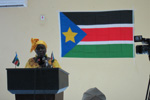
“These elections are an important lesson for us,” said Dr. Anne Itto, a senior official in the Sudan People’s Liberation Movement, or SPLM, at a press conference she convened yesterday to discuss the SPLM’s stance after four days of polling (today marked the end of polling in Sudan).
Dr. Itto’s remarks are a signal that her party, the ruling party in the South and the signatory along with the National Congress Party of the 2005 Comprehensive Peace Agreement, has wised up to an important trend that characterized the CPA’s post-2005 “interim period.” The trend has been evident in two of the major political processes called for in the CPA: the census (carried out in 2008 and 2009) and this month’s Sudan-wide elections.
In these complex and protracted technical exercises, sleights of hand by the NCP have enabled the regime to shape results in a way that suits their interests at the expense of free and fair processes. The ways in which the NCP rigged and manipulated both the census and the elections have been well-documented, and the important point at the moment is that much of the electoral gerrymandering was complete well before the polls opened last Sunday. Most of the irregularities of this week’s polling process have been widely reported to be “technical difficulties.” Indeed, some of these problems, from the wrong ballot papers being delivered to polling stations to the voter registries at these stations not containing a full list of those registered, appear to be technical issues that may be attributable to the fact that Sudan has not held multiparty elections in 24 years and that the vast majority of the population in the South cannot read and write.
However, the SPLM’s Dr. Itto made a compelling case yesterday that the National Electoral Commission, or NEC, could have done more to anticipate and resolve these irregularities prior to the start of polling “if they had had the will to do something.” She said that if the NEC had “really cared” about holding free and fair elections, then they could have conducted the electoral process differently, in a way that allowed the people of Sudan to express their political beliefs freely. Dr. Itto then linked this issue of what she called “negligence” back to next year’s self-determination referendum—an all-important issue for the South that will determine whether or not the region becomes independent next year: “The referendum is key so we must be careful with it,” she said, noting that the Referendum Commission’s members have not yet been announced, and that the SPLM intends to make sure these members are “serious” about the conduct of a free, fair, and credible referendum.
It’s wise of the SPLM to treat the elections as an opportunity to learn how the ruling party operates to engineer results and maintain its dominant position in Sudan. As the referendum looms, the SPLM can’t afford to be outwitted by NCP maneuvering again.
Photo: Dr. Anne Itto, a senior official of South Sudan’s ruling party, the SPLM. (Maggie Fick)

